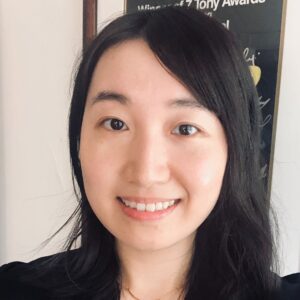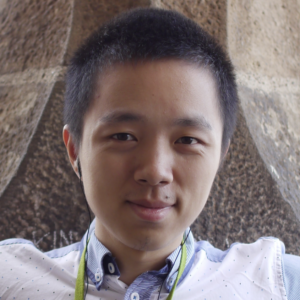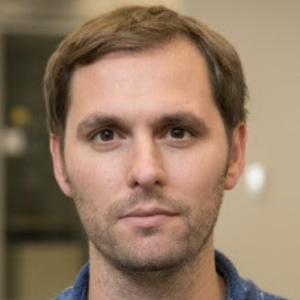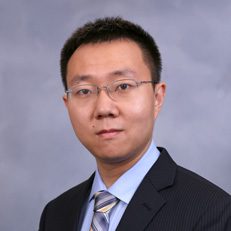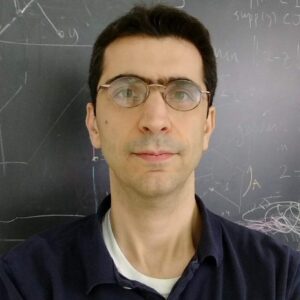On this page: About • Seminar Series • Spring 2026 Seminars • Fall 2025 Seminars • Summer 2025 Seminars • Spring 2025 Seminars • Fall 2024 Seminars • People • Sponsors

About
The Math and Data (MaD) group at CDS, in collaboration with the Courant Institute of Mathematical Sciences, focuses on building the mathematical and statistical foundations of data science. With expertise spanning signal processing, machine learning, deep learning, and high-dimensional statistics, the group tackles some of the field’s most critical challenges, from understanding neural networks to improving climate modeling.
Launched in 2017 by CDS Professor Joan Bruna, CDS Associate Professor Carlos Fernandez-Granda, and former colleague Afonso Bandeira, the group is known for its influential MaD Seminar, which serves as a hub for in-depth discussion on the theoretical foundations of machine learning and data science. The group’s research aims to make AI systems more interpretable and reliable by uncovering the mathematical principles underlying complex algorithms.
Whether developing mathematical frameworks to expedite climate simulations or exploring the optimal transport problem’s modern applications, MaD researchers balance theoretical rigor with practical impact. Their work, driven by a deep commitment to both pure math and real-world applications, positions them at the forefront of data science research.
Seminar Series
MaD and MIC
The Math and Data (MaD) Seminar Series at CDS serves as a forum to explore the mathematical foundations of data science, bringing together researchers from various disciplines to discuss topics ranging from classical statistics to modern machine learning. Founded in 2016 by CDS Associate Professor Carlos Fernandez-Granda, Professor Joan Bruna, and former NYU Assistant Professor Afonso Bandeira (now at ETH Zurich), the seminar reflects the diverse research interests of the MaD group’s faculty and has grown to become one of the longest-running and most impactful series at CDS.
The MaD Seminar has become a cornerstone of the CDS community, fostering a space where faculty, postdocs, and students can engage with groundbreaking research and cultivate new ideas. Regular speakers include both seasoned experts and promising new voices, making the series a launching pad for rising stars in the field. By bringing together these diverse perspectives, the MaD Seminar is not just a venue for presenting research but a catalyst for collaboration and innovation in data science.
The Mathematics, Information and Computation (MIC) Seminar runs at irregular intervals and covers specific aspects at the interface of applied maths, information theory and theory of computation.
Spring 2026 Seminars
MaD Seminar with Didier Henrion: Title TBA
Thursday, April 23, 2026, 2:00pm EST, Center for Data Science, NYU, 60 5th Ave
Abstract: TBA
Bio: TBA
MIC Seminar with Argyris Mouzakis: Optimal Differentially Private Sampling of Unbounded Gaussians
Thursday, January 29, 2026, 2:00pm EST, Center for Data Science, NYU, 60 5th Ave
Abstract: We provide the first O_{α,ε,δ}(d)-sample algorithm for sampling from unbounded Gaussian distributions under the constraint of (ε, δ)-differential privacy. This is a quadratic improvement over previous results for the same problem, settling an open question of Ghazi, Hu, Kumar, and Manurangsi. Based on joint work with Valentio Iverson and Gautam Kamath, which has appeared in COLT 2025, and is available on Arxiv.
Bio: Argyris Mouzakis is a final year PhD student in Computer Science at the University of Waterloo, advised by Gautam Kamath. Previously, he earned his MEng in Electrical and Computer Engineering from the National Technical University of Athens. He has been a recipient of the Cheriton and Onassis Foundation scholarships for the support of his doctoral studies.
Fall 2025 Seminars
MaD Seminar with Wolfgang Kerzendorf: Building Reliable Knowledge Across Disciplines: From Supernovae to the Systems of Science
Thursday, November 21, 2025, 2:00pm EST, Center for Data Science, NYU, 60 5th Ave
Abstract: Progress on today’s most demanding scientific questions, whether understanding stellar explosions or confronting climate and biomedical complexity, depends on extracting reliable knowledge from data through simulation-based inference. Such work is inherently interdisciplinary, drawing on physics, statistics, and machine learning. My research builds this bridge at two complementary levels: developing trustworthy inference frameworks for complex phenomena and creating the meta-scientific infrastructure that sustains interdisciplinary collaboration. In the first part, I present a new framework for astrophysical inference, where we reconstruct supernova explosions from spectral time series by coupling probabilistic neural-network emulators with Bayesian sampling. This approach enables millions of model evaluations that would be impossible with direct Monte Carlo radiative-transfer simulations, yielding new insights into the composition and energetics of stellar ejecta. In the second part, I turn to the practice of science itself. We develop open-source, machine-learning-driven infrastructure to make research more transparent and scalable: a neural global researcher registry that uniquely identifies contributors across disciplines, a data-driven peer-review platform that matches proposals to expertise efficiently and fairly, and metadata-extraction tools that reveal how research facilities and collaborations are actually used. Together, these efforts demonstrate how interpretable machine learning can advance both our understanding of the universe and the collaborative systems that make such understanding possible.
Bio: Dr. Wolfgang E. Kerzendorf is an Assistant Professor in the Departments of Physics & Astronomy and Computational Mathematics, Science & Engineering at Michigan State University, where he joined the faculty in 2019. His research connects the physics of plasmas and radiative transfer in stellar explosions and supernova ejecta with data-driven and machine-learning methods. As lead author and principal investigator of the open-source radiative-transfer code TARDIS, he develops community tools that couple atomic physics, radiation transport, and inference techniques to interpret the spectra of astrophysical transients. Dr. Kerzendorf’s group uses emulation, probabilistic inference, and modern statistical frameworks to map the relationships between theory and observation, revealing how progenitor structure and explosion physics shape observed spectra. His work spans detailed microphysics and large-scale inference, creating bridges between plasma modeling, radiative transport, and data science. Beyond astrophysics, he leads the DeepThought Initiative, a computational meta-science effort aimed at enhancing the process of scientific discovery itself. This work develops algorithmic and data-centric approaches to improve how science is conducted, reviewed, and connected in an era of exponential growth in both publications and researchers. It also focuses on strengthening the robustness and transparency of the scientific process at a time when public trust in science faces increasing challenges. Dr. Kerzendorf earned his Vordiplom in Physics from Universität Heidelberg and his Ph.D. in Astronomy & Astrophysics from the Australian National University in 2011. He held postdoctoral appointments at the University of Toronto, the European Southern Observatory, briefly as a senior researcher at NYU before joining MSU.
MaD Seminar with Qing Qu: Understanding Generalization of Deep Generative Models Requires Rethinking Underlying Low-dimensional Structures
Thursday, November 13, 2025, 2:00pm EST, Center for Data Science, NYU, 60 5th Ave
Abstract: Diffusion models represent a remarkable new class of deep generative models, yet the mathematical principles underlying their generalization from finite training data are poorly understood. This talk offers novel theoretical insights into diffusion model generalization through the lens of “model reproducibility,” revealing a surprising phase transition from memorization to generalization during training, notably occurring without the curse of dimensionality. Our theoretical framework hinges on two crucial observations: (i) the intrinsic low dimensionality of image datasets and (ii) the emergent low-rank property of the denoising autoencoder within trained neural networks. Under simplified settings, we rigorously establish that optimizing the training loss of diffusion models is mathematically equivalent to solving a canonical subspace clustering problem. This insight quantifies the minimal sample requirements for learning low-dimensional distributions, scaling linearly with the intrinsic dimension. Furthermore, by investigating this under a nonlinear two-layer network, we fully explain the memorization-to-generalization transition, highlighting inductive biases in learning dynamics and the models’ strong representation learning ability. These theoretical insights have profound practical implications, enabling various applications for generation control and safety, including concept steering, watermarking, and memorization detection. This work not only advances theoretical understanding but also stimulates numerous directions for many applications in engineering and science.
Bio: Qing Qu is an Assistant Professor in Electrical Engineering and Computer Science at the University of Michigan. He works at the intersection of the foundations of machine learning, numerical optimization, and signal/image processing, with a current focus on the theory of deep generative models and representation learning. Prior to joining Michigan in 2021, he was a Moore–Sloan Data Science Fellow at the Center for Data Science, New York University (2018–2020). He received his Ph.D. in Electrical Engineering from Columbia University in October 2018 and his B.Eng. in Electrical and Computer Engineering from Tsinghua University in July 2011. His work has been recognized with multiple honors, including the Best Student Paper Award at SPARS 2015, a Microsoft PhD Fellowship in Machine Learning (2016), the Best Paper Award at the NeurIPS Diffusion Models Workshop (2023), an NSF CAREER Award (2022), an Amazon Research Award (AWS AI, 2023), a UM CHS Junior Faculty Award (2025), and a Google Research Scholar Award (2025). He was one of the founding organizers and Program Chair for the new Conference on Parsimony & Learning (CPAL), regularly serves as an Area Chair for NeurIPS, ICML, and ICLR, and is an Action Editor for TMLR.
MIC Seminar with Kate Fisher: Precise Asymptotic Analysis of Sobolev Training for Random Feature Models
Monday, November 10, 2025, 2:00pm EST, Center for Data Science, NYU, 60 5th Ave
Abstract: Gradient data is widely relevant in science and engineering, so it is natural to use it to train neural networks. However, it remains unclear on a theoretical level how Sobolev training, the augmentation of regression loss functions with gradient data, performs in high dimensions and when the model is highly overparameterized. Studies of training with squared loss on function data have demonstrated that overparameterized networks can memorize noisy data yet outperform their underparameterized counterparts when generalizing to new test cases. This talk presents a precise asymptotic characterization of a random feature (RF) model under Sobolev training. Our analysis is carried out in the proportional asymptotics limit where the number of trainable parameters, input dimensions, and training data points jointly tend to infinity. This limit implies infinite spatial dimension, so we sketch gradients onto a finite dimensional subspace in the training loss, a technique consistent with practical applications of Sobolev training. By combining the replica method from statistical physics with linearization strategies from operator-valued free probability, we obtain a finite dimensional, efficient to solve, description of the generalization capabilities of the RF network, which allow us to identify the conditions under which gradient data improve generalization.
Bio: Kate Fisher is a graduate student at the Center for Computational Science and Engineering at MIT, working with Youssef Marzouk. Her research explores the theory of generalization and uncertainty in machine learning but also includes the practical construction of uncertainty aware surrogates for multi-scale materials simulation.
MaD Seminar with Yandi Shen: Learning single index model with gradient descent – spectral initialization and precise asymptotics
Thursday, November 6, 2025, 2:00pm EST, Center for Data Science, NYU, 60 5th Ave
Abstract: Non-convex optimization plays a central role in many statistics and machine learning problems. Despite the landscape irregularities for general non-convex functions, some recent work showed that for many learning problems with random data and large enough sample size, there exists a region around the true signal with benign landscape. Motivated by this observation, a widely used strategy is a two-stage algorithm, where we first apply a spectral initialization to plunge into the region, and then run gradient descent for further refinement. While this two-stage algorithm has been extensively analyzed for many non-convex problems, the precise distributional property of both its transient and long-time behavior remains to be understood. In this work, we study this two-stage algorithm in the context of single index models under the proportional asymptotics regime. We derive a set of dynamical mean field equations, which describe the precise behavior of the trajectory of spectral initialized gradient descent in the large system limit. We further show that when the spectral initialization successfully lands in a region of benign landscape, the above equation system is asymptotically time translation invariant and exponential converging, and thus admits a set of long-time fixed points that represents the mean field characterization of the limiting point of the gradient descent dynamic. As a proof of concept, we demonstrate our general theory in the example of regularized Wirtinger flow for phase retrieval. Based on joint work with Yuchen Chen.
Bio: Yandi Shen is currently an assistant professor in the Department of Statistics and Data Science at Carnegie Mellon University. He obtained his PhD in Statistics from University of Washington in 2021, and then spent two years at University of Chicago as a Kruskal instructor and one year at Yale University as a postdoctoral researcher. He is broadly interested in nonparametric and semiparametric statistics, high dimensional inference, and applied probability.
MaD Seminar with Leif Weatherby & Ben Recht: From Language Machines to Decision Machines – and Back.
Thursday, October 30, 2025, 2:00pm EST, Center for Data Science, NYU, 60 5th Ave
Abstract: Starting with Shannon’s pre-computer experiments and ending with a refactoring of our computational paradigm through a chat interface, computing begins and ends with language models. In this conversation, Ben Recht and Leif Weatherby discuss computing, bureaucracy, and language through the perspectives of their new books. Recht’s book, The Irrational Decision, examines how post-war efforts to create rational decision-making machines led to the foundational technologies of computer science. He describes how these excel in constrained contexts but struggle to capture the full complexity of human decision-making in the face of uncertainty. Weatherby’s book, Language Machines, presents a new theory of meaning in language and computation. Seeing LLMs as a convergence of computation and language, Weatherby contends that AI does not stimulate cognition, as widely believed, but rather creates culture. Recht and Weatherby will explore what happens when computational optimization algorithms are applied to language, situating the current boom in the intoxicating power of making sense of culture through numbers.
Bio: TBA
MaD Seminar with Boris Hanin: Kernel Learning on Manifolds
Thursday, October 23, 2025, 2:00pm EST, Center for Data Science, NYU, 60 5th Ave
Abstract: This talk concerns ongoing joint work with Mengxuan Yang on minimum norm interpolation with n samples in the RKHS of a kernel K. Unlike most prior work in this space our kernels will be defined on any close d-dimensional Riemannian manifold, and we require only that the kernels are trace class and elliptic. With these assumptions we get nearly sharp risk bounds with high probability over the data. Like prior work on round spheres our results essentially say that the number of samples n, the dimension of the manifold, and some details of the kernel determine a natural spectral cutoff lambda(n,d,K) and that minimal norm interpolation essentially learns exactly the projection of the data generating process onto the eigenfunctions of the Laplacian with frequency at most lambda(n,d,K). Joint work with Mengxuan Yang.
Bio: Boris an Associate Professor at Princeton ORFE (and Associated Faculty at Princeton PACM) working on deep learning, probability, and spectral asymptotics. Prior to Princeton, Boris was an Assistant Professor in Mathematics at Texas A&M, an NSF Postdoc at MIT Math, and a PhD student in Math at Northwestern, where he was supervised by Steve Zelditch.
He also works part time at Mithril (formerly Foundry), an incredible AI/computing startup that seeks to orchestrate the world’s computers, where Boris leads the Mithril Institute.
MaD Seminar with Pragya Sur: Data Integration: Challenges and Opportunities for Interpolation Learning under Distribution Shifts
Thursday, October 16, 2025, 2:00pm EST, Center for Data Science, NYU, 60 5th Ave
Abstract: Min-norm interpolators arise naturally as implicitly regularized limits of modern neural networks and other widely used algorithms. Recently, their out-of-distribution risk was studied when test samples are unavailable during training. However, in many applications, a limited amount of test data is typically accessible during training. The properties of min-norm interpolation in this setting remain poorly understood. In this talk, I will present a characterization of the risk associated with pooled min-L2-norm interpolation under both covariate and concept shifts. I will show that the pooled interpolator encompasses both early and an intermediate form of fusion. Our results yield several important insights. For instance, in the presence of concept shift, incorporating additional data can actually harm prediction performance when the signal-to-noise ratio is low. Conversely, for higher signal-to-noise ratios, transfer learning is beneficial—provided the shift-to-signal ratio remains below a precise threshold, which I will define. Furthermore, under covariate shift, we find that heterogeneity between domains can improve prediction accuracy when the model is sufficiently overparameterized. To reach these conclusions, we develop new advances in random matrix theory that are of broad utility in the study of heterogeneous data problems under overparametrization. Time permitting, I will discuss applications of our results to the challenge of combining real data with synthetic data generated by AI models. This is based on joint works with Anvit Garg, Kenny Gu, Yanke Song, and Sohom Bhattacharya.
Bio: Pragya Sur is an Assistant Professor of Statistics at Harvard University, currently on leave as a Visiting Professor at MIT’s Laboratory for Information and Decision Systems. She works on high-dimensional and overparametrized problems arising in statistics, machine learning, and data science. She is a recipient of the NSF Career Award, the Eric and Wendy Schmidt Fund for Strategic Innovation, the William F. Milton Fund Award, and a Dean’s Competitive Fund for Promising Scholarship. Among other honors, in 2021, she was invited to speak at the National Academies’ of Sciences, Engineering, and Medicine symposium on Mathematical Challenges for Machine Learning and Artificial Intelligence (AI). From 2022-2024, she was invited to lead the Institute of Mathematical Statistics New Researchers Group. Currently, she serves as an Associate Editor for Statistical Science and as an invited Guest Co-Editor for their special issue on statistics and AI. She is also an incoming Associate Editor for Journal of the Royal Statistical Society Series B.
MaD Seminar with Jingfeng Wu (UC Berkeley): A Statistical View on Implicit Regularization: Gradient Descent Dominates Ridge
Thursday, October 2, 2025, 2:00pm EST, Center for Data Science, NYU, 60 5th Ave
Abstract: A key puzzle in deep learning is how simple gradient methods find generalizable solutions without explicit regularization. This talk discusses the implicit regularization of gradient descent (GD) through the lens of statistical dominance. Using least squares as a clean proxy, we present three surprising findings.
First, GD dominates ridge regression: with comparable regularization, the excess risk of GD is always within a constant factor of ridge, but ridge can be polynomially worse even when tuned optimally. Second, GD is incomparable with SGD. While it is known that for certain problems GD can be polynomially better than SGD, the reverse is also true: we construct problems, inspired by benign overfitting theory, where optimally stopped GD is polynomially worse. Finally, GD dominates SGD for a significant subclass of problems — those with fast and continuously decaying covariance spectra — which includes all problems satisfying the standard capacity condition.
This is joint work with Peter Bartlett, Sham Kakade, Jason Lee, and Bin Yu.
Bio: Jingfeng Wu is a postdoctoral fellow at the Simons Institute for the Theory of Computing at UC Berkeley. His research focuses on deep learning theory, optimization, and statistical learning. He earned his Ph.D. in Computer Science from Johns Hopkins University in 2023. Prior to that, he received a B.S. in Mathematics (2016) and an M.S. in Applied Mathematics (2019), both from Peking University. In 2023, he was recognized as a Rising Star in Data Science by the University of Chicago and UC San Diego.
MaD Seminar with Eshaan Nichani: Emergence and Scaling Laws in SGD Learning of Shallow Neural Networks
Thursday, September 11, 2025, 2:00pm EST, Center for Data Science, NYU, 60 5th Ave
Abstract: In this talk, we study the sample and time complexity of online stochastic gradient descent (SGD) for learning a two-layer neural network with P orthogonal neurons on isotropic Gaussian data. We focus on the challenging “extensive-width” regime P>>1 and permit diverging condition number in the second-layer, covering as a special case the power-law scaling a_p= p^{-\beta}. We provide a precise analysis of SGD dynamics for the training of a student two-layer network to minimize the mean squared error (MSE) objective, and explicitly identify sharp transition times to recover each signal direction. In the power-law setting, we characterize scaling law exponents for the MSE loss with respect to the number of training samples and SGD steps, as well as the number of parameters in the student neural network. Our analysis entails that while the learning of individual teacher neurons exhibits abrupt transitions, the juxtaposition of 𝑃 ≫ 1 emergent learning curves at different timescales leads to a smooth scaling law in the cumulative objective. This is joint work with Yunwei Ren, Denny Wu, and Jason D. Lee.
Bio: Eshaan Nichani is a final-year PhD student at Princeton University, advised by Jason D. Lee and Yuxin Chen. His research focuses on the theory of deep learning, from understanding the statistical and computational limits of shallow networks trained with SGD, to proving learning guarantees for transformers in order to model how LLM capabilities such as in-context learning arise during training. He is a recipient of the IBM PhD Fellowship and the NDSEG Fellowship.
Summer 2025 Seminars
MaD Seminar with Pierre Marion (EPFL): Taking a Big Step: Large Learning Rates in Denoising Score Matching Prevent Memorization
Thursday, June 26, 2025, 2:00pm EST, Center for Data Science, NYU, 60 5th Ave
Abstract: Denoising score matching plays a pivotal role in the performance of diffusion-based generative models. However, the empirical optimal score–the exact solution to the denoising score matching–leads to memorization, where generated samples replicate the training data. Yet, in practice, only a moderate degree of memorization is observed, even without explicit regularization. In this paper, we investigate this phenomenon by uncovering an implicit regularization mechanism driven by large learning rates. Specifically, we show that in the small-noise regime, the empirical optimal score exhibits high irregularity. We then prove that, when trained by stochastic gradient descent with a large enough learning rate, neural networks cannot stably converge to a local minimum with arbitrarily small excess risk. Consequently, the learned score cannot be arbitrarily close to the empirical optimal score, thereby mitigating memorization. To make the analysis tractable, we consider one-dimensional data and two-layer neural networks. Experiments validate the crucial role of the learning rate in preventing memorization, even beyond the one-dimensional setting.
Bio: Pierre has been a postdoc researcher at EPFL under the supervision of Lénaïc Chizat since January 2024. He is currently a research fellow at UC Berkeley, for the Spring 2025 semester on Transformers and LLMs at the Simons Institute. Before that, he was a PhD student at Sorbonne Université under the supervision of Gérard Biau and Jean-Philippe Vert. His current research interests regard the theory of deep learning. He is interested in various architectures, ranging from shallow networks to generative models, and tries to understand their optimization and statistical properties.
Spring 2025 Seminars
MaD Seminar with Francis Bach (Ecole Normale Supérieure): Rethinking Early Stopping: Refine, Then Calibrate
Monday, May 19, 11:00am EST, Center for Data Science, NYU, 60 5th Ave
Abstract: Machine learning classifiers often produce probabilistic predictions that are critical for accurate and interpretable decision-making in various domains. The quality of these predictions is generally evaluated with proper losses like cross-entropy, which decompose into two components: calibration error assesses general under/overconfidence, while refinement error measures the ability to distinguish different classes. In this talk, I will provide theoretical and empirical evidence that these two errors are not minimized simultaneously during training. Selecting the best training epoch based on validation loss thus leads to a compromise point that is suboptimal for both calibration error and, most importantly, refinement error. To address this, we introduce a new metric for early stopping and hyperparameter tuning that makes it possible to minimize refinement error during training. The calibration error is minimized after training, using standard techniques. Our method integrates seamlessly with any architecture and consistently improves performance across diverse classification tasks. Joint work with Eugène Berta, David Holzmüller, and Michael Jordan.
Bio: Francis Bach is a researcher at Inria, leading since 2011 the machine learning team which is part of the Computer Science department at Ecole Normale Supérieure. He graduated from Ecole Polytechnique in 1997 and completed his Ph.D. in Computer Science at U.C. Berkeley in 2005, working with Professor Michael Jordan.
Francis Bach is primarily interested in machine learning, and especially in sparse methods, kernel-based learning, neural networks, and large-scale optimization. He published the book “Learning Theory from First Principles” through MIT Press in 2024.
He obtained in 2009 a Starting Grant and in 2016 a Consolidator Grant from the European Research Council, and received the Inria young researcher prize in 2012, the ICML test-of-time award in 2014 and 2019, the NeurIPS test-of-time award in 2021, as well as the Lagrange prize in continuous optimization in 2018, and the Jean-Jacques Moreau prize in 2019. He was elected in 2020 at the French Academy of Sciences. In 2015, he was program co-chair of the International Conference in Machine learning (ICML), general chair in 2018, and president of its board between 2021 and 2023; he was co-editor-in-chief of the Journal of Machine Learning Research between 2018 and 2023.
MaD Seminar with Theodor Misiakiewicz: Learning under group equivariance: a perspective from harmonic analysis
Thursday, April 24, 2:00pm EST, Center for Data Science, NYU, 60 5th Ave
Abstract: Modern machine learning heavily relies on the success of large-scale models trained via gradient-based algorithms. A major effort in recent years has been to understand the fundamental limits of these learning algorithms: What is the complexity of gradient-based training? Which distributions can these algorithms learn efficiently? Can we identify simple principles underlying feature learning?
To make progress on these questions, we focus in this talk on a key property of `generic’ gradient-based methods: their equivariance with respect to a large symmetry group G. Motivated by this observation, we develop a group-theoretic framework to analyze the complexity of G-equivariant learning algorithms when trained on a target distribution D. Focusing on statistical query (SQ) algorithms, we introduce two complexity measures—the Alignment complexity and the Leap complexity—which aim to quantify the difficulty of weak and strong learning under group equivariance. These measures depend explicitly on the interplay between the data distribution D, the group G, and the allowed statistics Q, and can be computed using tools from harmonic analysis.
We show that this framework reveals a natural factorization of the symmetry group and data distribution, and suggests a sequential, adaptive learning process. Finally, using our results, we revisit recent work on learning juntas and multi-index models, and provide new insights into learning Gaussian single-index models.
This is based on joint work with Hugo Koubbi (Yale), Nirmit Joshi (TTIC), and Nati Srebro (TTIC).
Bio: Theodor Misiakiewicz is an Assistant Professor in the Department of Statistics and Data Science at Yale University. He obtained his Ph.D. from Stanford in June 2023 and was a Research Assistant Professor at TTIC from September 2023 to June 2024. His research lies broadly at the intersection of machine learning and statistics, with a particular focus on deep learning theory.
MIC Seminar with Zhangyang “Atlas” Wang from University of Austin and XTX Markets: Training Foundation Models for Algorithmic Trading
Thursday, April 18, 10:00am EST, Center for Data Science, NYU, 60 5th Ave
Abstract: In this talk, I will introduce the pioneering efforts of XTX Markets in applying large-scale foundation models to algorithmic trading. I will highlight both the unique challenges and exciting opportunities in forecasting financial markets using sophisticated deep neural networks trained on massive, heterogeneous datasets. Specifically, I will present a high-level discussion of how our models can be trained to utilize diverse market data to generate robust forecasts across thousands of financial instruments globally. I will also cover our experiences in “neural scaling laws” on market data as a novel modality, amid extreme market noise and volatility. Finally, I will introduce our latest research initiatives, emphasizing XTX’s substantial investments in computational infrastructure, innovative modeling approaches, and proprietary research.
Bio: Dr. Zhangyang “Atlas” Wang serves as Research Director at XTX Markets, a leading high-frequency trading firm that manages over $300 billion in daily trading volume. He founded and currently leads the firm’s newly established AI Lab in New York City, dedicated to building large-scale foundation models specifically for financial time series and market data, powered by XTX’s rapidly growing proprietary AI infrastructure. Dr. Wang is presently on leave from his position as the Temple Foundation Endowed Associate Professor at The University of Texas at Austin, where he has significantly advanced research in machine learning, optimization, and computer vision. His contributions have garnered numerous prestigious awards, and he has mentored an extensive network of Ph.D. students and postdocs who now occupy tenure-track faculty positions or senior roles at major technology firms. Check the group page for more information: Visual Informatics Group @ University of Texas at Austin
MaD Seminar with Yuqi Gu: Deep Discrete Encoders: Identifiable Deep Generative Models for Rich Data with Discrete Latent Layers
Thursday, April 17, 2:00pm EST, Center for Data Science, NYU, 60 5th Ave
Abstract: In the era of generative AI, deep generative models (DGMs) with latent representations have gained tremendous popularity. Despite their impressive empirical performance, the statistical properties of these models remain underexplored. DGMs are often overparametrized, non-identifiable, and uninterpretable black boxes, raising serious concerns when deploying them in high-stakes applications. Motivated by this, we propose an interpretable deep generative modeling framework for rich data types with discrete latent layers, called Deep Discrete Encoders (DDEs). A DDE is a directed graphical model with multiple binary latent layers. Theoretically, we propose transparent identifiability conditions for DDEs, which imply progressively smaller sizes of the latent layers as they go deeper. Identifiability ensures consistent parameter estimation and inspires an interpretable design of the deep architecture. Computationally, we propose a scalable estimation pipeline of a layerwise nonlinear spectral initialization followed by a penalized stochastic approximation EM algorithm. This procedure can efficiently estimate models with exponentially many latent components. Extensive simulation studies validate our theoretical results and demonstrate the proposed algorithms’ excellent performance. We apply DDEs to three diverse real datasets for hierarchical topic modeling, image representation learning, response time modeling in educational testing, and obtain interpretable findings.
Bio: Yuqi Gu is an Assistant Professor in the Department of Statistics at Columbia University and also a member of the Data Science Institute. Her research revolves around investigating unobserved latent structures widely present in statistics, machine learning, psychometrics, etc. She studies deep generative models and statistical machine learning, high-dimensional statistics with latent structures, latent variable modeling in psychometrics and other applications. Before joining Columbia, she obtained her PhD in Statistics from the University of Michigan in 2020 and did a postdoc at Duke University from 2020-2021.
MaD Seminar with Lechao Xiao: Rethinking conventional wisdom in machine learning: from generalization to scaling
Thursday, April 10, 2:00pm EST, Center for Data Science, NYU, 60 5th Ave
Abstract: The remarkable success of large language pretraining and the discovery of scaling laws signify a paradigm shift in machine learning. Notably, the primary objective has evolved from minimizing generalization error to reducing approximation error, and the most effective strategy has transitioned from regularization (in a broad sense) to scaling up models. This raises a critical question: Do the established principles that proved successful in the generalization-centric era remain valid in this new era of scaling? This paper examines several influential regularization-based principles that may no longer hold true in the scaling-centric, large language model (LLM) era. These principles include explicit L2 regularization and implicit regularization through small batch sizes and large learning rates. Additionally, we identify a new phenomenon termed “scaling law crossover,” where two scaling curves intersect at a certain scale, implying that methods effective at smaller scales may not generalize to larger ones. Together, these observations highlight two fundamental questions within this new paradigm:
∙ Guiding Principles for Scaling: If regularization is no longer the primary guiding principle for model design, what new principles are emerging to guide scaling?
∙ Model Comparison at Scale: How to reliably and effectively compare models at the scale where only a single experiment is feasible?
Bio: LechaoXiao is a Research Scientist at Google DeepMind in NYC, focusing on scaling research. Previously, he contributed to the Google Brain team.
He holds a Ph.D. in Mathematics from the University of Illinois at Urbana-Champaign, specialized in harmonic analysis, and served as a Hans Rademacher Instructor of Mathematics at the University of Pennsylvania.
MaD Seminar with Daniel Hsu
Thursday, April 3, 2:00pm EST, Center for Data Science, NYU, 60 5th Ave
Abstract: TBA
Bio: TBA
MaD Seminar with Tim Kunisky (John Hopkins): Towards a general theory of low degree algorithms in statistics
Thursday, March 20, 11:00am EST, Center for Data Science, NYU, 60 5th Ave
Abstract: Understanding how effectively polynomials solve statistical problems like hypothesis testing and estimation has recently proven fruitful for making accurate predictions about computational hardness, statistical-to-computational gaps, and trade-offs between dataset quality and computational cost. I will present recent work that aims to unite many of these analyses and identify mathematical principles governing what such problems low degree polynomials can solve. I will first present low coordinate degree functions, a generalization of low degree polynomials that turns out to be essential to applying this kind of analysis beyond “integrable” statistical models having well-understood associated orthogonal polynomials. I will then show how the performance of these functions exhibits universality: whether or not they can detect a given continuous signal through a noisy channel depends very little on the structure of the channel, allowing existing analyses of low degree polynomials to be immediately generalized to a wide range of models. Finally, I will describe analogous phenomena and tools for models having discrete signals, such as stochastic block models and their generalizations.
Bio: Tim Kunisky is an assistant professor in the Department of Applied Mathematics and Statistics of Johns Hopkins University. His research broadly concerns how probability theory and mathematical statistics interact with computational complexity and the theory of algorithms, drawing on tools from asymptotic statistics, random matrix theory, convex geometry, and statistical physics. Before joining Johns Hopkins, he was a postdoctoral associate in Computer Science at Yale University, and received his PhD in Mathematics from New York University.
MaD Seminar with Yaoyu Zhang (Shanghai Jiao Tong University): The Condensation Phenomenon of Deep Neural Networks
Thursday, February 13, 2:00pm EST, 150 Auditorium Room, Center for Data Science, NYU, 60 5th Ave
Abstract: Condensation (also known as quantization, weight clustering, or alignment) is a widely observed phenomenon where neurons in the same layer tend to align with one another during the nonlinear training of deep neural networks (DNNs). It is a key characteristic of the feature learning process of neural networks. However, due to the strong nonlinear nature of this phenomenon, establishing its theoretical understanding remains challenging. In this talk, I will present our systematic efforts to tackle this challenge in recent years. First, I will present results regarding the dynamical regime identification of condensation at the infinite width limit, where small initialization is crucial. Then, I will discuss the mechanism of condensation at the initial training stage and the global loss landscape structure underlying condensation in later training stages, highlighting the prevalence of condensed critical points and global minimizers. Finally, I will present results on the quantification of condensation and its generalization advantage, which includes a novel estimate of sample complexity in the best-possible scenario. These results underscore the effectiveness of the phenomenological approach to understanding DNNs, paving a way for a deeper understanding of deep learning in the near future.
Bio: Yaoyu Zhang is an associate professor at the Institute of Natural Sciences and the School of Mathematical Sciences at Shanghai Jiao Tong University. He obtained his Ph.D. in Mathematics in 2016 from Shanghai Jiao Tong University. Between 2016 and 2020, he engaged in postdoctoral research at New York University Abu Dhabi and the Courant Institute, as well as the Institute for Advanced Study in Princeton. His research is centered on the theoretical underpinnings of deep learning, with a particular emphasis on the nonlinear training dynamics and the analysis of the global loss landscape in deep learning.
Fall 2024 Seminars
MaD Seminar with Yury Polyanskiy (MIT): Optimal Quantization for Matrix Multiplication
Thursday, Dec 5, 10:30am EST, 7th Floor Open Space, Center for Data Science, NYU, 60 5th Ave
Abstract: The main building block of large language models is matrix multiplication, which is often bottlenecked by the speed of loading these matrices from memory. A possible solution is to trade accuracy for speed by storing the matrices in low precision (“quantizing” them). In recent years a number of quantization algorithms with increasingly better performance were proposed (e.g., SmoothQuant, Brain compression, GPTQ, QuIP, QuIP#, QuaRot, SpinQuant). In this work, we prove an information theoretic lower bound on achievable accuracy of computing matrix product as a function of compression rate (number of bits per matrix entry). We also construct a quantizer (based on nested lattices) achieving this lower bound.
Based on a joint work with Or Ordentlich (HUJI), arXiv:2410.13780.
Bio: Yury Polyanskiy is a Professor of Electrical Engineering and Computer Science and a member of IDSS and LIDS at MIT. Yury received M.S. degree in applied mathematics and physics from the Moscow Institute of Physics and Technology, Moscow, Russia in 2005 and Ph.D. degree in electrical engineering from Princeton University, Princeton, NJ in 2010. His research interests are in information theory, statistical learning and error-correcting codes.
Dr. Polyanskiy was elected IEEE Fellow (2024), and won the 2020 IEEE Information Theory Society James Massey Award, 2013 NSF CAREER award and 2011 IEEE Information Theory Society Paper Award.
MaD Seminar with Renyuan Xu (NYU): Generative diffusion models: optimization, generalization and fine-tuning
November 7, 2:00pm EST, Auditorium Hall 150, Center for Data Science, NYU, 60 5th Ave
Abstract: Recently, generative diffusion models have outperformed previous architectures, such as GANs, in generating high-quality synthetic data, setting a new standard for generative AI. A key component of these models is learning the associated Stein’s score function. Though diffusion models have demonstrated practical success, their theoretical foundations are far from mature, especially regarding whether gradient-based algorithms can provably learn the score function. In this talk, I will present a suite of non-asymptotic theory aimed at understanding the data generation process in diffusion models and the accuracy of score estimation. Our analysis addresses both the optimization and generalization aspects of the learning process, establishing a novel connection to supervised learning and neural tangent kernels.
Building on these theoretical insights, another key challenge arises when fine-tuning pre-trained diffusion models for specific tasks or datasets to improve performance. Fine-tuning requires refining the generated outputs based on particular conditions or human preferences while leveraging prior knowledge from the pre-trained model. In the second part of the talk, we formulate this fine-tuning as a stochastic control problem, establishing its well-definedness through the Dynamic Programming Principle and proving convergence for an iterative Bellman scheme.
This talk is based on joint works with Yinbin Han (NYU) and Meisam Razaviyayn (USC).
Bio: Renyuan Xu is an assistant professor at the Department of Finance and Risk Engineering at New York University. Previously, she was an assistant professor at the University of Southern California and a Hooke Research Fellow at the University of Oxford. She completed her Ph.D. from UC Berkeley in 2019. Her research interests include stochastic analysis, stochastic control and games, machine learning theory, and mathematical finance. She received an NSF CAREER Award in 2024, the SIAM Financial Mathematics and Engineering Early Career Award in 2023, and a JP Morgan AI Faculty Research Award in 2022.
MaD Seminar with Nikita Zhivotovskiy (UC Berkeley): Mean and covariance estimation of anisotropic distributions in the presence of adversarial outliers
October 10, 2:00pm EST, Auditorium Hall 150, Center for Data Science, NYU, 60 5th Ave
Abstract: Suppose we are observing a sample of independent random vectors with unknown general covariance structure, knowing that the original distribution was contaminated, so that a fraction of observations came from a different distribution. How to estimate the mean and the covariance matrix of the original distribution in this case? In this talk, we discuss some recent estimators that achieve the optimal non-asymptotic, dimension-free rate of convergence under the model where the adversary can corrupt a fraction of the samples arbitrarily. The discussion will cover a wide range of distributions including heavy-tailed, sub-Gaussian, and specifically Gaussian distributions.
Bio: Nikita Zhivotovskiy is an Assistant Professor in the Department of Statistics at the University of California Berkeley. He previously held postdoctoral positions at ETH Zürich in the department of mathematics hosted by Afonso Bandeira, and at Google Research, Zürich hosted by Olivier Bousquet. He also spent time at the Technion I.I.T. mathematics department hosted by Shahar Mendelson. Nikita completed his thesis at Moscow Institute of Physics and Technology under the guidance of Vladimir Spokoiny and Konstantin Vorontsov.
MIC Seminar with Anya Katsevich (MIT): Laplace asymptotics in high-dimensional Bayesian inference
September 30, 12:00pm EST, Room 650, Center for Data Science, NYU, 60 5th Ave
Abstract: Computing integrals against a high-dimensional posterior distribution is the major computational bottleneck in Bayesian inference. A popular technique to make this computation cheaper is to use the Laplace approximation (LA), a Gaussian distribution, in place of the true posterior. Yet the accuracy of this approximation is not fully understood in high dimensions. We derive a new, leading order asymptotic decomposition of the LA error in high dimensions. This leads to lower bounds which resolve the question of the dimension dependence of the LA. It also leads to a simple modification to the LA which yields a higher-order accurate posterior approximation. Finally, we derive the high-dimensional analogue of the classical asymptotic expansion of Laplace-type integrals. This opens the door to approximating the partition function (aka the posterior normalizing constant), of use in high-dimensional model selection and many other applications beyond statistics.
MaD Seminar with Cyril Letrouit (Orsay): Stability of optimal transport: old and new
September 19, 2:00pm EST, Auditorium Hall 150, Center for Data Science, NYU, 60 5th Ave
Abstract: Optimal transport consists in sending a given source probability measure to a given target probability measure, in a way which is optimal with respect to some cost. On bounded subsets of R^d, if the cost is given by the squared Euclidean distance and the source measure is absolutely continuous, a unique optimal transport map exists.
The question we will discuss is the following: how does this optimal transport map change if we perturb the target measure? For instance, if instead of the target measure we only have access to samples of it, how much does the optimal transport map change? This question, motivated by numerical aspects of optimal transport, has started to receive partial answers only recently, under quite restrictive assumptions on the source measure. We will review these answers and show how to handle much more general cases.
This is a joint work with Quentin Mérigot.
MaD Seminar with Joel A. Tropp (Caltech): Randomly pivoted Cholesky
September 12, 2:00pm EST, Auditorium Hall 150, Center for Data Science, NYU, 60 5th Ave
Abstract: André-Louis Cholesky entered École Polytechnique as a student in 1895. Before 1910, during his work as a surveyer for the French army, Cholesky invented a technique for solving positive-definite systems of linear equations. Cholesky’s method can also be used to approximate a positive-semidefinite (psd) matrix using a small number of columns, called “pivots”. A longstanding question is how to choose the pivot columns to achieve the best possible approximation.
This talk describes a simple but powerful randomized procedure for adaptively picking the pivot columns. This algorithm, randomly pivoted Cholesky (RPC), provably achieves near-optimal approximation guarantees. Moreover, in experiments, RPC matches or improves on the performance of alternative algorithms for low-rank psd approximation.
Cholesky died in 1918 from wounds suffered in battle. In 1924, Cholesky’s colleague, Commandant Benoit, published his manuscript. One century later, a modern adaptation of Cholesky’s method still yields state-of-the-art performance for problems in scientific machine learning.
Joint work (Randomly pivoted Cholesky: Practical approximation of a kernel matrix with few entry evaluations) with Yifan Chen, Ethan Epperly, and Rob Webber.
September 12
Joel A. Tropp: Randomly Pivoted Cholesky
André-Louis Cholesky entered École Polytechnique as a student in 1895. Before 1910, during his work as a surveyer for the French army, Cholesky invented a technique for solving positive-definite systems of linear equations. Cholesky’s method can also be used to approximate a positive-semidefinite (psd) matrix using a small number of columns, called “pivots”. A longstanding question is how to choose the pivot columns to achieve the best possible approximation.
This talk describes a simple but powerful randomized procedure for adaptively picking the pivot columns. This algorithm, randomly pivoted Cholesky (RPC), provably achieves near-optimal approximation guarantees. Moreover, in experiments, RPC matches or improves on the performance of alternative algorithms for low-rank psd approximation.
Cholesky died in 1918 from wounds suffered in battle. In 1924, Cholesky’s colleague, Commandant Benoit, published his manuscript. One century later, a modern adaptation of Cholesky’s method still yields state-of-the-art performance for problems in scientific machine learning.
Joint work (“Randomly pivoted Cholesky: Practical approximation of a kernel matrix with few entry evaluations“) with Yifan Chen, Ethan Epperly, and Rob Webber.
September 19
Cyril Letrouit: Stability of optimal transport: old and new
Optimal transport consists in sending a given source probability measure to a given target probability measure, in a way which is optimal with respect to some cost. On bounded subsets of R^d, if the cost is given by the squared Euclidean distance and the source measure is absolutely continuous, a unique optimal transport map exists.
The question we will discuss is the following: how does this optimal transport map change if we perturb the target measure? For instance, if instead of the target measure we only have access to samples of it, how much does the optimal transport map change? This question, motivated by numerical aspects of optimal transport, has started to receive partial answers only recently, under quite restrictive assumptions on the source measure. We will review these answers and show how to handle much more general cases.
This is a joint work with Quentin Mérigot.
People
Core Faculty
MaD Core Faculty
Affiliated Faculty
MaD Affiliated Faculty
PhD / MSc Students
Postdocs and Fellows
MaD Postdocs and Fellows
Sponsors
We are thankful for the generous financial support of the following institutions:
- National Science Foundation
- National Institutes of Health
- Alfred P. Sloan Foundation
- ARO
- Vesri Schmidt Futures
- Samsung Research
- Samsung Electronics
- Capital One


